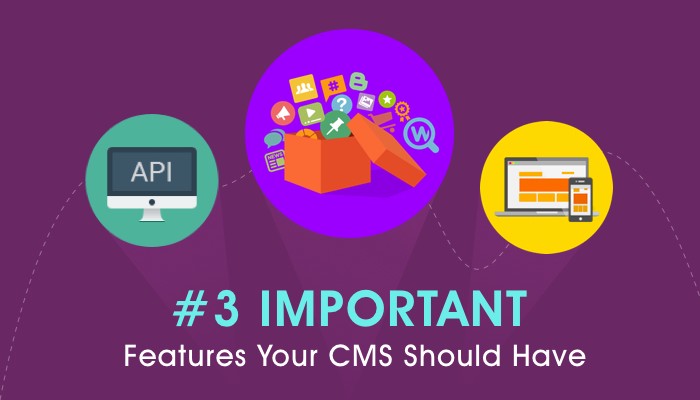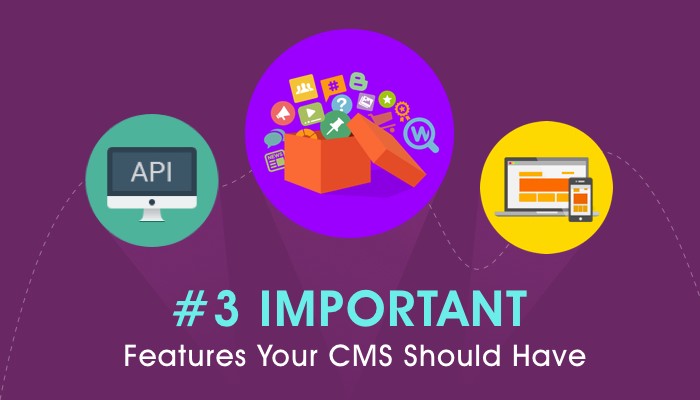by Rachael Ray
How to choose the right CMS based on these important features
A Content Management System (CMS) is a web-based application. Multiple users with different access levels can operate the data, as well as modify the content of a website/project or an internet application.

If you are developing a new website, a Content Management System is your best bet as you will have full control of your content and product sales. The biggest advantage is that you can manage your entire internet marketing strategy under one roof.
A CMS allows you to administer and assign diverse levels of permission access to users. When choosing a CMS, you need to keep two things in mind:
- Figure out your stakeholders
- Prioritize their requirements.
Now, deciding on a CMS platform is akin to buying a new smartphone.
Wondering how?
Let me explain.
Choosing the right CMS for you and your team
When you sit down to buy a new smartphone, the sheer number of options available will boggle your mind. The same is the case with CMS. The number of platforms to choose from is mind-boggling.
On the one hand, there are the popular and well-known platforms like WordPress, Joomla, and Drupal. And on the other hand, there are around 1000–2000 open source Web Content Management Systems which you can choose from.
Every CMS will have its own set of features to offer. Some platforms may offer all the requisite functions you need, while others might offer an unmatched intuitive experience. So, it becomes confusing as to which features are crucial as there are many basic features which are common to all the CMS platforms.
Here are a few basic features which you should consider while choosing a CMS platform. They are mostly common across all platforms:
- The platform should be steadfast and convenient
- It should have an easy navigation
- The platform should be flexible
- The site maintenance cost should not be very high
- The platform should have a streamlined authoring process
Apart from these basic features, there are three very important features your CMS should have. Let’s take a look at them in more detail:
1) An open API
API is the most commonly used term when it comes to CMS. Everybody from Mark Zuckerberg to the developer next door talks about APIs. What makes the API such a crucial feature?
An Application Programming Interface (API) is an intermediary software that promotes data exchange between two systems so that they can interact and share data with ease.
A CMS with an open API allows you to create a website and build apps that are detached from their content management tools and are integrated via the API. This gives you the benefit of using your choice of front-end tools. Also, you will be able to integrate a customized CMS with other external and internal systems, effortlessly. It is commercially viable and saves a lot of time, too.
2) Out of the box Plugins
Plugins allow you to customize attributes of your website effortlessly and easily.
They help in enhancing the scalability and functionality of the website.
Look for a CMS platform which has built-in SEO tools. With these, you can optimize the page for both the readers and the search engine. Having SEO plugins will help you to add page titles, put in metadata descriptions, and will also help in complying with the accessibility guidelines. It will also help in preventing duplicate content.
Also, when deciding on a platform, make sure you choose a platform which offers social media widgets and online marketing tools. This will make it easy for you to add social media sharing buttons to any piece or page of your content.
Plugins also allow you to integrate ERP (Enterprise Resource Planner) and CRM (Customer Relationship Management) systems. Make sure that your chosen platform has such plugins.
WordPress as a CMS platform offers scores of plugins. Also, it is the most preferred platform and there is a huge demand for WordPress website development in the market. To get the best service for your web development needs, you can hire one of the top WordPress development companies.
3) Design independence
Finally, the platform you choose should be open enough to allow modifications to the design and the layout. A customized design will have a huge impact on the user and thus will make them stay longer on the page. The platform should also offer flexibility to customize the interface so that you can craft the best experience for managing your content. The platform should not impose the templates on you. Rather it should be flexible enough to allow customization.
The CMS platform should provide you with the authority to make changes to the templates so that you can make your content stand out. It also allows you to bring into focus certain aspects on your page which you might want to highlight.
The CMS should give you the freedom to tweak and re-frame a few aspects so that it is in accordance with your needs and requirements.
Also, having a personalized design will encourage the customer to browse through your content and stay on the page rather than flipping through it.
To sum up
Now that you know which features to look out for, you can settle on your desired CMS platform and weed out the rest.
After all, a good Content Management System is a platform which is able to incorporate all your business needs and requirements and minimize the limitations as far as possible.
Be it micro data requirements or easy to use templates, your CMS should have these important features discussed above so that your business can deliver a seamless digital experience to all your customers.
